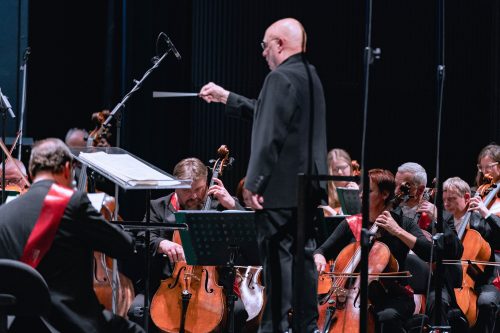Czech Republic Skrowaczewski, Bruckner: Brno Philharmonic Orchestra / Dennis Russell Davies (conductor). Janáček Theatre, Brno, 24.11.2023. (GT)

Stanisław Skrowaczewski – Passacaglia immaginaria
Bruckner – Symphony No.6 in A significant, WAB 106
The musical creativity of the Polish conductor and composer Skrowaczewski (1923-2017) is little recognized regardless of his lengthy affiliation with ensembles each in the US and Europe. Passacaglia immaginaria was impressed by the Baroque passacaglia kind and commissioned by the Minnesota Orchestra in 1995, which gave the premiere underneath the conductor’s baton, and was nominated for a Pulitzer Prize. Denis Russell Davies was a longstanding pal of the composer, and this efficiency marks the delivery centenary of Skrowaczewski in October 2023.
In keeping with his writer Schott: ‘No two Skrowaczewski scorings are precisely the identical. He creates a novel tonal canvas for every bit, continuing from a palette devised for the substance of the piece, all the time plumbing the deepest swimming pools of sound and exploiting unique percussion. The result’s extremely colored, evocative music rendered in a free harmonic language that heightens the emotional content material of every work.’
‘Skilful, imaginative, and stuffed with ardour, the works of Stanislaw Skrowaczewski problem a musician’s method whereas increasing the listeners’ consciousness of the facility of music to explain the indescribable. For the composer, all artwork is a dialogue with the unknown. “This dialogue,” says the composer, “encompasses all the basic human considerations such because the that means of life and dying, love and cruelty, and sacrifice and redemption within the fixed hope to know that which can’t be recognized. Artwork thrives on metaphysical concepts … and is a robust antidote for the religious ills of our chaotic, violent and troubled instances.”’
I had by no means heard this Polish/American composer’s music, so this night supplied entry into his soundworld. The Passacaglia immaginaria opened on the percussion, strings and celeste, which created a unusually distinctive ambiance and embraced a variety of feelings, but little significant impression. There have been hints of Shostakovich’s symphonies, particularly within the remaining shifting bars with the mass strings slowly bringing to a memorable conclusion, heard towards the celeste lastly making a shifting impression – however there was little originality within the thirty-minute work.
After all, Skrowaczewski’s most celebrated recordings had been his full Bruckner cycle as a conductor. I confess that I’ve not heard any of his recordings, but his work was properly obtained, and he gained a prize for his Bruckner Ninth recording. The Bruckner Sixth was a welcome inclusion within the programme significantly as Dennis Russell Davies is a famend interpreter of the composer; throughout his tenure on the Bruckner Orchestra Linz, he carried out and recorded the entire Bruckner symphonies. Since he assumed the chief conductorship of the Brno Philharmonic Orchestra in 2018, he has performed performances of the First, Fourth and Fifth symphonies – anticipating the composer’s delivery centenary in 2024.
In his lifetime, Bruckner solely heard the center two actions of the Sixth when it was carried out by the Vienna Philharmonic Orchestra. Mahler gave the premiere, albeit with cuts, in 1899 in Vienna. It was solely in 1935 that the unique model was carried out underneath the baton of Paul van Kempen. The Sixth has all the time been thought much less well-liked, for as Austrian musicologist Max Auer advised, it misses the ‘heroic fireplace of most of its sisters.’
The opening motion (Maestoso) was impressively intense as there emerged the sensation as if one was observing the solar rising on a misty morning within the mountains, and because the decrease strings entered there was generated a passage of imposing grandeur. There was glorious virtuosity from the strings led by Pavel Wallinger, and particularly from the fantastic brass, and the strings performed with abandon from one part to a different. Nonetheless, the inevitable Brucknerian rhythm emerged amid superb taking part in from the horns, particularly from Karel Hofmann. Bruckner’s theme of craving was demonstrated fantastically by the strings, with the energetic horns and the trumpets proclaiming the fanfare.
The Adagio proved the emotional core of this efficiency, and it was achieved by Davies with nice energy and depth – the intonation of the oboe solo by Anikó Kovarikné Hegedűs in anticipating the horn theme was of celestial magnificence. The mastery of Davies’s conducting was palpable in commanding the strings earlier than the C minor melody on the violins ushered in a funereal march-like passage. The orchestra was in high kind right here, particularly within the dreamlike moments within the Scherzo, and enhanced by the mysterious and charming trio. It was noticeable how Davies masterfully managed the silences between sections, permitting the power of the concepts and themes to be realised with nice precision – this was most perceptible within the Finale executed with terrific virtuosity and confidence. The brass chorale with the three intertwined themes created song-like elan earlier than the thought from the opening motion returned forcefully.
This was an impressive efficiency of a symphony that isn’t all the time appreciated, but right here in Dennis Russell Davies’s conducting it was revealed as among the many composer’s masterworks. Definitely, this live performance reveals how this wonderful orchestra embraces a repertoire of uncared for twentieth-century works and the gems of the nineteenth century and shows nice virtuosity in all of the orchestral sections led by an excellent conductor.
Gregor Tassie

